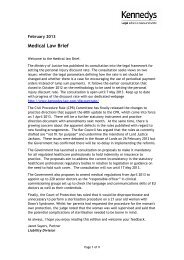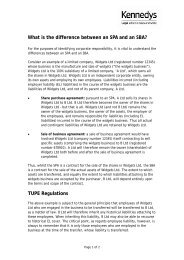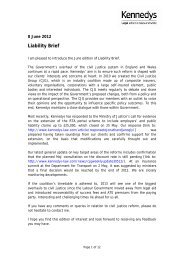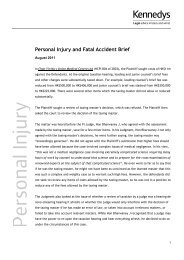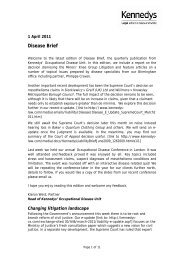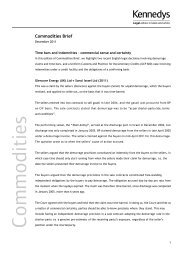Chinese Bilateral Investment Treaties: Restrictions on ... - Kennedys
Chinese Bilateral Investment Treaties: Restrictions on ... - Kennedys
Chinese Bilateral Investment Treaties: Restrictions on ... - Kennedys
You also want an ePaper? Increase the reach of your titles
YUMPU automatically turns print PDFs into web optimized ePapers that Google loves.
<str<strong>on</strong>g>Chinese</str<strong>on</strong>g> <str<strong>on</strong>g>Bilateral</str<strong>on</strong>g> <str<strong>on</strong>g>Investment</str<strong>on</strong>g><br />
<str<strong>on</strong>g>Treaties</str<strong>on</strong>g>: <str<strong>on</strong>g>Restricti<strong>on</strong>s</str<strong>on</strong>g> <strong>on</strong><br />
Internati<strong>on</strong>al Arbitrati<strong>on</strong><br />
by<br />
GORDON SMITH<br />
Reprinted from<br />
(2010) 76 Arbitrati<strong>on</strong> 58-69<br />
Sweet & Maxwell<br />
100 Avenue Road<br />
Swiss Cottage<br />
L<strong>on</strong>d<strong>on</strong><br />
NW3 3PF<br />
(Law Publishers)
CHINESE BILATERAL INVESTMENT TREATIES<br />
<str<strong>on</strong>g>Chinese</str<strong>on</strong>g> <str<strong>on</strong>g>Bilateral</str<strong>on</strong>g> <str<strong>on</strong>g>Investment</str<strong>on</strong>g> <str<strong>on</strong>g>Treaties</str<strong>on</strong>g>: <str<strong>on</strong>g>Restricti<strong>on</strong>s</str<strong>on</strong>g><br />
<strong>on</strong> Internati<strong>on</strong>al Arbitrati<strong>on</strong><br />
by GORDON SMITH<br />
1. INTRODUCTION<br />
China has entered into more bilateral investment treaties (BITs) than any other country,<br />
having signed a total of 115, of which 85 have come into force. The majority of these are<br />
treaties with developing countries but a number are with China’s western trading partners,<br />
such as the United Kingdom, Germany, Netherlands, Italy, Sweden, Australia and New<br />
Zealand. China’s willingness to enter into BITs over the past 20 years to protect foreign<br />
investors’ interests has been partially resp<strong>on</strong>sible for the significant growth in foreign direct<br />
investment into China over that period.<br />
Prior to 1998, in comm<strong>on</strong> with other communist countries, China, by the terms of the<br />
relevant BIT, either did not provide for disputes to be settled by internati<strong>on</strong>al arbitrati<strong>on</strong>, 1 or<br />
restricted an investor’s right to refer disputes to internati<strong>on</strong>al arbitrati<strong>on</strong> <strong>on</strong>ly to those disputes<br />
c<strong>on</strong>cerning the amount of compensati<strong>on</strong> payable under the protecti<strong>on</strong> from expropriati<strong>on</strong> or<br />
nati<strong>on</strong>alisati<strong>on</strong> provisi<strong>on</strong>. 2 Foreign investors are required to bring all other disputes in the<br />
nati<strong>on</strong>al courts of China, which does not provide an effective remedy. An example is art.12(3)<br />
of the Singapore–China BIT 3 :<br />
“If a dispute involving the amount of compensati<strong>on</strong> resulting from expropriati<strong>on</strong>, nati<strong>on</strong>alizati<strong>on</strong><br />
or other measures having effect equivalent to nati<strong>on</strong>alizati<strong>on</strong> or expropriati<strong>on</strong>...<br />
cannot be settled within six m<strong>on</strong>ths after resort to negotiati<strong>on</strong>..., it may be submitted to an<br />
internati<strong>on</strong>al arbitral tribunal established by both parties.” 4<br />
Since 1998 however, China has relaxed this policy and entered into a number of BITs where<br />
investors enjoy an unrestricted right to bring any dispute c<strong>on</strong>cerning a potential breach of<br />
the BIT to internati<strong>on</strong>al arbitrati<strong>on</strong>. An example is art.9 of the Germany–China BIT, 5 which<br />
allows investors to commence internati<strong>on</strong>al arbitrati<strong>on</strong> under the auspices of the Internati<strong>on</strong>al<br />
Centre for Settlement of <str<strong>on</strong>g>Investment</str<strong>on</strong>g> Disputes (ICSID), unless the parties agree <strong>on</strong> ad hoc<br />
arbitrati<strong>on</strong> under the UNCITRAL Rules, with respect to “any dispute c<strong>on</strong>cerning investments”<br />
after a six m<strong>on</strong>th negotiati<strong>on</strong> period. 6<br />
Notwithstanding the restricti<strong>on</strong>s <strong>on</strong> dispute resoluti<strong>on</strong> c<strong>on</strong>tained in the first generati<strong>on</strong><br />
of <str<strong>on</strong>g>Chinese</str<strong>on</strong>g> BITs, most c<strong>on</strong>tain comprehensive substantive protecti<strong>on</strong> measures for foreign<br />
investors, including rights to “fair and equitable treatment” of investments, “protecti<strong>on</strong> and<br />
1 See for example, the dispute resoluti<strong>on</strong> provisi<strong>on</strong>s in the Thailand–China BIT, and the<br />
Sweden–China BIT (more recently supplemented by a protocol providing for an investor-state<br />
dispute resoluti<strong>on</strong> mechanism).<br />
2 Excepti<strong>on</strong>s to this policy include the Netherlands–China, which came into force <strong>on</strong> February<br />
1, 1987, and the UK–China BIT, which came into force <strong>on</strong> May 15, 1986, both of which allow<br />
an investor to refer any dispute to internati<strong>on</strong>al arbitrati<strong>on</strong>.<br />
3 The Singapore–China BIT came into force <strong>on</strong> February 7, 1986.<br />
4 Other examples include the Australia–China BIT (art.XII(2)), and the New Zealand–China BIT<br />
(art.13(3)).<br />
5 The Germany–China BIT came into force <strong>on</strong> December 11, 2005.<br />
6 Pursuant to the Protocol to the BIT, subject also to the investor having referred the issue to an<br />
administrative review procedure according to <str<strong>on</strong>g>Chinese</str<strong>on</strong>g> law, and the dispute still existing three<br />
m<strong>on</strong>ths after the investor has brought the issue to the review procedure.<br />
58 February 2010
(2010) 76 ARBITRATION 1<br />
security” of investments, and protecti<strong>on</strong> of investments from “expropriati<strong>on</strong> or nati<strong>on</strong>alisati<strong>on</strong>”.<br />
In additi<strong>on</strong>, most of the sec<strong>on</strong>d generati<strong>on</strong> of <str<strong>on</strong>g>Chinese</str<strong>on</strong>g> BITs c<strong>on</strong>tain “umbrella<br />
clauses”—arguably providing an investor with a wide scope of protecti<strong>on</strong>—typically specifying:<br />
“Each C<strong>on</strong>tracting Party shall observe any other obligati<strong>on</strong> it has entered into with regard<br />
to investments in its territory by investors of the other C<strong>on</strong>tracting Party.” 7<br />
These two generati<strong>on</strong>s of <str<strong>on</strong>g>Chinese</str<strong>on</strong>g> BITs give rise to two c<strong>on</strong>troversial issues in investorstate<br />
disputes: first, the effect of a restricti<strong>on</strong> <strong>on</strong> the types of dispute that can be referred<br />
to internati<strong>on</strong>al arbitrati<strong>on</strong> in similar terms to art.12(3); sec<strong>on</strong>dly, whether a nati<strong>on</strong>al of a<br />
state party to the first generati<strong>on</strong> can apply the unrestricted arbitrati<strong>on</strong> provisi<strong>on</strong>s in the new<br />
generati<strong>on</strong> by invoking a most favoured nati<strong>on</strong>s (MFN) clause c<strong>on</strong>tained in the relevant basic<br />
treaty. This article discusses recent investor-state awards as they apply to these two issues.<br />
2. THE EFFECT OF CHINESE BILATERAL INVESTMENT TREATY<br />
RESTRICTIONS ON INTERNATIONAL ARBITRATION<br />
Earlier tribunal decisi<strong>on</strong>s <strong>on</strong> restricti<strong>on</strong>s <strong>on</strong> internati<strong>on</strong>al arbitrati<strong>on</strong><br />
Prior to recent decisi<strong>on</strong>s discussed later in this paper, restricti<strong>on</strong>s similar to those in art.12(3)<br />
were c<strong>on</strong>sidered to mean that there must first be a determinati<strong>on</strong> as to whether a state has<br />
expropriated an investment before any dispute c<strong>on</strong>cerning “the amount of compensati<strong>on</strong><br />
resulting” from such expropriati<strong>on</strong> under art.12(3) could be referred to an arbitral tribunal.<br />
If this principle is correct, then in practice the scope of applicati<strong>on</strong> of provisi<strong>on</strong>s such as<br />
art.12(3) is limited, since it is likely that China, like most states, would argue that there had<br />
been no breach of the expropriati<strong>on</strong> provisi<strong>on</strong> of the Singapore–China BIT in the first place,<br />
and therefore a tribunal had no jurisdicti<strong>on</strong>.<br />
Not surprisingly, given the limited scope of the right to refer disputes to internati<strong>on</strong>al<br />
arbitrati<strong>on</strong> in the first generati<strong>on</strong> of <str<strong>on</strong>g>Chinese</str<strong>on</strong>g> BITs, and the limited practical applicati<strong>on</strong> of<br />
provisi<strong>on</strong>s such as art.12(3), there is no evidence that any investor commenced an investorstate<br />
arbitrati<strong>on</strong> against China. Support for the restricted scope of provisi<strong>on</strong>s such as art.12(3)<br />
stems from the decisi<strong>on</strong>s of the investor-state tribunals in Vladimir and Moise Berschader<br />
v Russian Federati<strong>on</strong>, 8 which involved a claim by Belgian nati<strong>on</strong>als under the Belgium-<br />
Luxembourg Ec<strong>on</strong>omic Uni<strong>on</strong>-Soviet Uni<strong>on</strong> BIT, and RosInvestCo UK Ltd v The Russian<br />
Federati<strong>on</strong>, 9 which involved a claim by UK nati<strong>on</strong>als under the UK–Soviet Uni<strong>on</strong> BIT.<br />
In Berschader 10 the tribunal held that art.10 of the BIT, which gave investors the right<br />
to arbitrate disputes <strong>on</strong>ly “c<strong>on</strong>cerning the amount or mode of compensati<strong>on</strong> paid under<br />
Article 5” (being the protecti<strong>on</strong> from expropriati<strong>on</strong> provisi<strong>on</strong>), excluded “disputes c<strong>on</strong>cerning<br />
whether or not an act of expropriati<strong>on</strong> actually occurred under Article 5”, and therefore, the<br />
tribunal had no jurisdicti<strong>on</strong> under the BIT to hear such disputes.<br />
In RosInvestCo 11 the tribunal c<strong>on</strong>sidered a similarly worded provisi<strong>on</strong> in art.8 of the<br />
UK–Soviet Uni<strong>on</strong> BIT, which provides (emphasis added):<br />
7 Germany–China BIT art.10(2).<br />
8 Vladimir and Moise Berschader v Russian Federati<strong>on</strong>, award in Stockholm under the auspices<br />
of the Arbitrati<strong>on</strong> Institute of the Stockholm Chamber of Commerce, April 21, 2006.<br />
9 RosInvestCo UK Ltd v The Russian Federati<strong>on</strong>, award in Stockholm under the auspices of the<br />
Arbitrati<strong>on</strong> Institute of the Stockholm Chamber of Commerce, October 2007.<br />
10 Berschader, award of the Arbitrati<strong>on</strong> Institute of the Stockholm Chamber of Commerce, April<br />
21, 2006.<br />
11 RosInvestCo award of the Arbitrati<strong>on</strong> Institute of the Stockholm Chamber of Commerce,<br />
October 2007.<br />
February 2010 59
CHINESE BILATERAL INVESTMENT TREATIES<br />
“(1) This Article shall apply to any legal disputes between an investor of <strong>on</strong>e C<strong>on</strong>tracting<br />
Party in relati<strong>on</strong> to an investment of the former either c<strong>on</strong>cerning the amount or<br />
payment of compensati<strong>on</strong> under Articles 4 or 5 of this Agreement [art.4 provides for<br />
compensati<strong>on</strong> to investors arising from armed c<strong>on</strong>flict, etc. and art.5 is the protecti<strong>on</strong><br />
from expropriati<strong>on</strong> provisi<strong>on</strong>], or c<strong>on</strong>cerning any other matter c<strong>on</strong>sequential up<strong>on</strong> an<br />
act of expropriati<strong>on</strong> in accordance with Article 5 of this Agreement...<br />
(2) Any such disputes which have not been amicably settled shall, after a period of three<br />
m<strong>on</strong>ths from written notificati<strong>on</strong> of a claim, be submitted to internati<strong>on</strong>al arbitrati<strong>on</strong><br />
if either party to the dispute so wishes.”<br />
The tribunal c<strong>on</strong>sidered that the reference in art.8(1) to “the amount or payment of<br />
compensati<strong>on</strong> under Articles 4 or 5 of this Agreement”, in its ordinary meaning, c<strong>on</strong>tained<br />
“a limitati<strong>on</strong> of the jurisdicti<strong>on</strong> c<strong>on</strong>ferred by that clause”. The tribunal c<strong>on</strong>sidered the terms<br />
of art.5 itself, which the tribunal noted specified payment of compensati<strong>on</strong> <strong>on</strong>ly as the third<br />
excepti<strong>on</strong> to the requirement that investments shall not be expropriated, and interpreted this<br />
to mean that the terms of art.8(1) could <strong>on</strong>ly apply to this third excepti<strong>on</strong>. The tribunal<br />
c<strong>on</strong>cluded therefore that the terms of art.8(1) did not extend to the tribunal’s jurisdicti<strong>on</strong><br />
over questi<strong>on</strong>s of whether an expropriati<strong>on</strong> has occurred and was legal. Note however that<br />
the tribunal held that it had jurisdicti<strong>on</strong> to decide this issue by applying the MFN clause, as<br />
discussed in s.3 below.<br />
Recent tribunal decisi<strong>on</strong>s <strong>on</strong> restricti<strong>on</strong>s <strong>on</strong> internati<strong>on</strong>al arbitrati<strong>on</strong><br />
As at the end of 2006, the positi<strong>on</strong> under Berschader and RosInvestCo was that investors<br />
covered by the first generati<strong>on</strong> of <str<strong>on</strong>g>Chinese</str<strong>on</strong>g> BITs could <strong>on</strong>ly refer quantum of expropriati<strong>on</strong><br />
to arbitrati<strong>on</strong>, with the questi<strong>on</strong> of whether expropriati<strong>on</strong> actually occurred to be decided by<br />
<str<strong>on</strong>g>Chinese</str<strong>on</strong>g> nati<strong>on</strong>al courts. However, this situati<strong>on</strong> may have changed following the investor-<br />
State awards in Renta 4 S.V.S.A. v The Russian Federati<strong>on</strong>, 12 and Tza Yap Shum v The<br />
Republic of Peru, 13 and the English High Court decisi<strong>on</strong> in The Czech Republic v European<br />
Media Ventures SA, 14 dismissing an applicati<strong>on</strong> by the Czech Republic to set aside an<br />
investor-State award <strong>on</strong> jurisdicti<strong>on</strong>. All three tribunals held that similarly worded restricti<strong>on</strong>s<br />
in the respective BITs gave the tribunal jurisdicti<strong>on</strong> not <strong>on</strong>ly to hear disputes c<strong>on</strong>cerning<br />
the amount of compensati<strong>on</strong> arising from expropriati<strong>on</strong> by the state but also whether<br />
expropriati<strong>on</strong> had occurred in the first place, directly c<strong>on</strong>trary to the decisi<strong>on</strong>s in Berschader<br />
and RosInvestCo.<br />
In Renta 4, seven Spanish entities claimed that the Russian government had expropriated<br />
their investments in Yukos American Depository Receipts as a c<strong>on</strong>sequence of measures<br />
taken by the government against the Yukos Oil Company, in breach of arts 4 to 6 of the<br />
Spain–Soviet Uni<strong>on</strong> BIT. Article 10(1) refers to any dispute between Russia and an investor<br />
“relating to the amount or method of payment of the compensati<strong>on</strong> due under Article 6”<br />
(being the expropriati<strong>on</strong> provisi<strong>on</strong>). Russia objected to the tribunal’s jurisdicti<strong>on</strong>, arguing<br />
that <strong>on</strong>ly disputes c<strong>on</strong>cerning the amount or method of payment of compensati<strong>on</strong> due under<br />
art.6 are subject to arbitrati<strong>on</strong> under art.10(1). Russia argued that there was a c<strong>on</strong>tinuing<br />
disagreement between the parties as to whether expropriati<strong>on</strong> of the investment had taken<br />
place, which must be resolved in some other proper forum (in this case, the Russian nati<strong>on</strong>al<br />
courts) before matters of quantum could go to internati<strong>on</strong>al arbitrati<strong>on</strong> under art.10.<br />
The tribunal analysed the award in Berschader and noted that the decisi<strong>on</strong> <strong>on</strong> expropriati<strong>on</strong><br />
was obiter dicta since the tribunal’s c<strong>on</strong>clusi<strong>on</strong> <strong>on</strong> the effect of the restricti<strong>on</strong> <strong>on</strong> arbitrati<strong>on</strong><br />
12 Renta 4 S.V.S.A. v The Russian Federati<strong>on</strong>, award <strong>on</strong> jurisdicti<strong>on</strong> in Stockholm under the<br />
auspices of the Arbitrati<strong>on</strong> Institute of the Stockholm Chamber of Commerce, March 20, 2009.<br />
13 Tza Yap Shum v The Republic of Peru ICSID Case No.ARB/07/6, June 19, 2009.<br />
14 Czech Republic v European Media Ventures SA [2007] EWHC 2851, December 5, 2007.<br />
60 February 2010
(2010) 76 ARBITRATION 1<br />
was superfluous to its primary finding that the investor had no standing with respect to its<br />
indirect investment. 15 The tribunal stated:<br />
“It cannot be adopted by the present arbitrators because it does not do justice to the extensive<br />
and refined debate which has emerged in the present case. There is no way of knowing from<br />
their award how the Berschader arbitrators would have reacted to the points raised here.” 16<br />
The tribunal described the tribunal’s treatment of this issue in Berschader as “essentially to<br />
endorse an assumpti<strong>on</strong>. That simply cannot be decisive either way.” 17<br />
The tribunal also referred to the recent decisi<strong>on</strong> of the English High Court in European<br />
Media Ventures. The tribunal had interpreted a limitati<strong>on</strong> <strong>on</strong> arbitrati<strong>on</strong> in art.8(1) of the<br />
Czech Republic–Belgian Luxembourg Ec<strong>on</strong>omic Uni<strong>on</strong> BIT, which referred to disputes<br />
“c<strong>on</strong>cerning compensati<strong>on</strong> due by virtue of Article 3 paragraphs (1) and (3)” (being the<br />
expropriati<strong>on</strong> provisi<strong>on</strong>s), as being an exclusi<strong>on</strong> from jurisdicti<strong>on</strong> <strong>on</strong>ly of any claim for<br />
relief other than compensati<strong>on</strong> (such as restituti<strong>on</strong> or a declarati<strong>on</strong> that a c<strong>on</strong>tract was still<br />
in force), thereby allowing jurisdicti<strong>on</strong> as to whether expropriati<strong>on</strong> had in fact taken place.<br />
Sim<strong>on</strong> J. upheld the award: the word “compensati<strong>on</strong>” in art.8(1) limits the scope of<br />
arbitrati<strong>on</strong>, but the word “c<strong>on</strong>cerning” is broad and similar to other comm<strong>on</strong> expressi<strong>on</strong>s in<br />
arbitrati<strong>on</strong> clauses such as “relating to” and “arising out of”. As a matter of ordinary meaning,<br />
the word “c<strong>on</strong>cerning” covers every aspect of its subject, including issues of entitlement as<br />
well as quantificati<strong>on</strong>. He c<strong>on</strong>cluded:<br />
“As the Tribunal noted, the effect of the Czech Republic’s argument is that a tribunal is<br />
precluded from c<strong>on</strong>sidering or making any determinati<strong>on</strong> <strong>on</strong> any of the elements of Article<br />
3(1) or (3), despite what may be the need for a close examinati<strong>on</strong> of the nature of the<br />
c<strong>on</strong>duct in questi<strong>on</strong> and the circumstances when c<strong>on</strong>sidering the questi<strong>on</strong> of the amount of<br />
compensati<strong>on</strong>. This favours an interpretati<strong>on</strong> in favour of determinati<strong>on</strong> by the tribunal and<br />
against parallel or duplicative proceedings.”<br />
The tribunal in Renta 4 noted that the presence of the word “due” in art.10(1) did not dissuade<br />
the High Court from finding that the tribunal had jurisdicti<strong>on</strong> to determine entitlement<br />
(c<strong>on</strong>trary to Russia’s argument <strong>on</strong> this wording). It c<strong>on</strong>sidered that the wording of art.10(1)<br />
“entrains the power to determine whether there has been a compensable event in the first<br />
place”. 18 It also c<strong>on</strong>sidered various extraneous materials, including other BITs signed by<br />
Russia, c<strong>on</strong>cluding:<br />
“It is moreover implausible that States would want to provide for inter-State arbitrati<strong>on</strong> of<br />
c<strong>on</strong>troversies as to whether an expropriati<strong>on</strong> had occurred at the same time as they carve out<br />
the possibility of separate investor-State arbitrati<strong>on</strong> with respect to the amount and method<br />
of compensati<strong>on</strong>. Such pointless and unprecedented complicati<strong>on</strong>s would be absurd. The<br />
noti<strong>on</strong> of acti<strong>on</strong>s before the courts of the host country are problematic in principle. Courts<br />
are <strong>on</strong> the internati<strong>on</strong>al level equivalent to other organs of the State. This means that the<br />
predicate of obtaining any amount of compensati<strong>on</strong> according to any method would be<br />
hostage to the host State’s self-determinati<strong>on</strong> as to whether it is due at all.” 19<br />
The most recent award <strong>on</strong> jurisdicti<strong>on</strong> in Tza Yap Shun is notable because it is the first<br />
reported case in which a <str<strong>on</strong>g>Chinese</str<strong>on</strong>g> investor has claimed under a <str<strong>on</strong>g>Chinese</str<strong>on</strong>g> BIT, the Peru–China<br />
BIT. Tza alleged that Peru’s violati<strong>on</strong>s of the Peru–China BIT adversely affected his<br />
15 Renta 4 March 20, 2009 at [23].<br />
16 Renta 4 March 20, 2009 at [23].<br />
17 Renta 4 March 20, 2009 at [53].<br />
18 Renta 4 March 20, 2009 at [39].<br />
19 Renta 4 March 20, 2009 at [58].<br />
February 2010 61
CHINESE BILATERAL INVESTMENT TREATIES<br />
investment in a Peruvian company in the business of producing fish-based food products<br />
and the export of these to Asian markets. Peru denied Tza’s allegati<strong>on</strong>s and objected to the<br />
jurisdicti<strong>on</strong> of ICSID and the tribunal <strong>on</strong> a number of grounds.<br />
The Peru–China BIT came into force in February 1995, and is therefore an example of the<br />
first generati<strong>on</strong> of <str<strong>on</strong>g>Chinese</str<strong>on</strong>g> BITs. Article 8(3), the arbitrati<strong>on</strong> provisi<strong>on</strong>, is similarly drafted<br />
to the equivalent provisi<strong>on</strong> c<strong>on</strong>sidered in Renta 4 :<br />
“If a dispute involving the amount of compensati<strong>on</strong> for expropriati<strong>on</strong> cannot be settled<br />
within six m<strong>on</strong>ths after resort to negotiati<strong>on</strong>s specified in Paragraph 1 of this Article, it may<br />
be submitted at the request of either party to the internati<strong>on</strong>al arbitrati<strong>on</strong> of [ICSID].”<br />
The resp<strong>on</strong>dent argued that art.8(3) provides for internati<strong>on</strong>al arbitrati<strong>on</strong> of limited scope,<br />
namely, that it is <strong>on</strong>ly after the domestic courts determine that the investment was in fact<br />
expropriated and that there has been no agreement between the parties <strong>on</strong> the amount of<br />
compensati<strong>on</strong>, that the investor may submit to internati<strong>on</strong>al arbitrati<strong>on</strong> any dispute involving<br />
the amount of compensati<strong>on</strong> owed to the investor.<br />
The tribunal held that the terms of art.8(3) includes not <strong>on</strong>ly the determinati<strong>on</strong> of the<br />
amount of compensati<strong>on</strong> but also,<br />
“any other issues normally inherent to an expropriati<strong>on</strong>, including whether the property was<br />
actually expropriated in accordance with the BIT provisi<strong>on</strong>s and requirements”. 20<br />
In support of its argument, the resp<strong>on</strong>dent adduced evidence from a <str<strong>on</strong>g>Chinese</str<strong>on</strong>g> expert witness<br />
regarding the terms of numerous BITs signed by China between 1993 and 1998, and the<br />
evidence of senior government officials from both China and Peru who were involved in<br />
negotiating the Peru–China BIT between 1992 and 1994. The tribunal c<strong>on</strong>sidered that this<br />
evidence indicated China was not willing to accept the Peruvian proposal <strong>on</strong> ICSID arbitrati<strong>on</strong><br />
with regard to all the issues that could arise between an investor and the Government of<br />
China, but that it did not clearly establish if China’s c<strong>on</strong>sent under art.8(3) was limited<br />
<strong>on</strong>ly to disputes involving the amount of compensati<strong>on</strong> for expropriati<strong>on</strong>, or if it would also<br />
include disputes involving other issues.<br />
The tribunal’s approach was to apply art.31 of the Vienna C<strong>on</strong>venti<strong>on</strong>, to interpret the<br />
provisi<strong>on</strong> in accordance with its “ordinary meaning”. The tribunal referred to the term<br />
“involving” in art.8(3) and c<strong>on</strong>sidered that the <strong>on</strong>ly requirement is that the dispute must<br />
“include” the determinati<strong>on</strong> of the amount of compensati<strong>on</strong>, and not that the dispute must be<br />
restricted solely to this issue. The tribunal noted that art.4, the protecti<strong>on</strong> from expropriati<strong>on</strong><br />
provisi<strong>on</strong>, c<strong>on</strong>tained a number of elements of potential dispute, including the amount of<br />
compensati<strong>on</strong> payable, thereby indicating that art.8(3) could have wider scope. The tribunal<br />
referred with approval to the similar reas<strong>on</strong>ing of the English High Court in European Media<br />
Ventures discussed above, describing the decisi<strong>on</strong> as “the most thorough and detailed” of the<br />
previous decisi<strong>on</strong>s <strong>on</strong> the issue.<br />
The tribunal was also of the view that, if it accepted the resp<strong>on</strong>dent’s interpretati<strong>on</strong><br />
of art.8(3), it would lead to “an incoherent c<strong>on</strong>clusi<strong>on</strong>”, 21 that the investor would never<br />
have access to arbitrati<strong>on</strong>. The tribunal also c<strong>on</strong>sidered the decisi<strong>on</strong>s in Berschader and<br />
RosInvestCo, and was critical of the reas<strong>on</strong>ing of the tribunals in both cases.<br />
3. APPLICATION OF MFN CLAUSES TO ESTABLISH A TRI-<br />
BUNAL’S JURISDICTION<br />
The questi<strong>on</strong> of whether an investor can extend a tribunal’s jurisdicti<strong>on</strong> by an MFN clause<br />
in a basic treaty to a type of dispute not falling within the scope of the dispute resoluti<strong>on</strong><br />
20 Renta 4 March 20, 2009 at [188].<br />
21 Renta 4 March 20, 2009 at [154].<br />
62 February 2010
(2010) 76 ARBITRATION 1<br />
clause c<strong>on</strong>tained in the basic treaty has been c<strong>on</strong>troversial and has given rise to a number<br />
of c<strong>on</strong>flicting awards. This is of importance to foreign investors, since investors bound<br />
by the first generati<strong>on</strong> of <str<strong>on</strong>g>Chinese</str<strong>on</strong>g> BITs have the potential to enhance their protecti<strong>on</strong> by<br />
applying MFN clauses in their basic treaty to import the broader dispute resoluti<strong>on</strong> provisi<strong>on</strong>s<br />
c<strong>on</strong>tained in the sec<strong>on</strong>d generati<strong>on</strong>.<br />
Most BITs c<strong>on</strong>tain provisi<strong>on</strong>s comm<strong>on</strong>ly referred to as MFN clauses. The beneficiary<br />
of an MFN clause is entitled to the more favourable treatment accorded by the state party<br />
to nati<strong>on</strong>als of a third country. The more favourable treatment is found in a “third-party<br />
treaty”, which is then incorporated by reference into the basic treaty without any additi<strong>on</strong>al<br />
act of transformati<strong>on</strong> and governs the rights of the beneficiary of the MFN clause. The<br />
rati<strong>on</strong>ale for the MFN standard in the c<strong>on</strong>text of BITs is to prevent discriminati<strong>on</strong> against<br />
nati<strong>on</strong>als of different countries and to ensure equality of treatment by the host state regardless<br />
of the nati<strong>on</strong>ality of investors. A typical example of an MFN clause is in art.4 of the<br />
Singapore–China BIT:<br />
“[N]either C<strong>on</strong>tracting Party shall in its territory subject investments admitted in accordance<br />
with the provisi<strong>on</strong>s of Article 2 or returns of nati<strong>on</strong>als and companies of the other C<strong>on</strong>tracting<br />
Party to treatment less favourable than that which it accords to investments or returns of<br />
nati<strong>on</strong>als and companies of any third State.”<br />
MFN clauses depend for their scope up<strong>on</strong> the c<strong>on</strong>duct of the state signatories, since as so<strong>on</strong> as<br />
a state signatory grants more favourable treatment to investors from a third state, the benefits<br />
are automatically extended to the nati<strong>on</strong>als of a state that benefits from the MFN clause. MFN<br />
clauses therefore allow investors a potentially wide ranging protecti<strong>on</strong> by allowing them to<br />
“treaty shop” for provisi<strong>on</strong>s in third-party treaties that may be more favourable than those<br />
c<strong>on</strong>tained in the basic treaty. As China has entered into some 115 BITs, often providing for<br />
substantive protecti<strong>on</strong> of investments in different terms, there is ample scope for investors to<br />
seek wider protecti<strong>on</strong> in third-party treaties, including provisi<strong>on</strong>s giving unrestricted rights<br />
to refer disputes to internati<strong>on</strong>al arbitrati<strong>on</strong>.<br />
It is now well established that the beneficiary of an MFN clause can invoke the substantive<br />
rights of a third-party treaty. 22 However, the questi<strong>on</strong> of whether an MFN clause can have<br />
the effect of widening the scope of jurisdicti<strong>on</strong> by means of third-party dispute resoluti<strong>on</strong><br />
provisi<strong>on</strong>s is more difficult, and has given rise to c<strong>on</strong>flicting investor-state decisi<strong>on</strong>s. In<br />
these cases either an investor has failed to comply with a c<strong>on</strong>diti<strong>on</strong> precedent to arbitrati<strong>on</strong><br />
c<strong>on</strong>tained in the relevant BIT, and has sought to invoke a less restrictive arbitrati<strong>on</strong> clause<br />
c<strong>on</strong>tained in a third-party BIT in order to commence arbitrati<strong>on</strong> proceedings, or alternatively,<br />
seeks to extend the jurisdicti<strong>on</strong> of the tribunal by reference to disputes that the investor has<br />
no right to refer to internati<strong>on</strong>al arbitrati<strong>on</strong> under the basic treaty.<br />
The tribunal in Emilio Agustin Maffezini v Kingdom of Spain 23 applied the MFN clause in<br />
the Argentina–Spain BIT to provide the claimant with the more favourable dispute resoluti<strong>on</strong><br />
provisi<strong>on</strong>s c<strong>on</strong>tained in the Chile–Spain BIT, which provided for a direct right to internati<strong>on</strong>al<br />
arbitrati<strong>on</strong>, 24 as part of the substantive protecti<strong>on</strong> extended to the beneficiary of the clause.<br />
The Argentina–Spain BIT dispute provisi<strong>on</strong>s provided for a six-m<strong>on</strong>th negotiati<strong>on</strong> phase<br />
before the dispute could be submitted to the competent courts of the host state and, failing<br />
settlement of the dispute after the expiry of 18 m<strong>on</strong>ths, to internati<strong>on</strong>al arbitrati<strong>on</strong> under<br />
the auspices of ICSID or an ad-hoc tribunal under the UNCITRAL Rules. Maffezini, an<br />
22 See MTD Equity Sdn Bhd and MTD Chile SA v Republic of Chile ICSID Case No.ARB/01/07,<br />
Award, May 25, 2004.<br />
23 Emilio Agustin Maffezini v Kingdom of Spain ICSID Case No.ARB/97/7, Decisi<strong>on</strong> <strong>on</strong><br />
Jurisdicti<strong>on</strong>, January 25, 2000.<br />
24 Chile–Spain BIT art.10(2), which provides for the investor’s right to refer disputes to<br />
internati<strong>on</strong>al arbitrati<strong>on</strong> after a six m<strong>on</strong>th period allowed for negotiati<strong>on</strong>s has expired.<br />
February 2010 63
CHINESE BILATERAL INVESTMENT TREATIES<br />
Argentina nati<strong>on</strong>al, did not comply with the requirement to submit the dispute to the Spanish<br />
courts and Spain objected to the tribunal’s jurisdicti<strong>on</strong>. Maffezini, in his defence, relied <strong>on</strong><br />
the terms of the MFN clause in the Argentina–Spain BIT. The tribunal accepted Maffezini’s<br />
argument and held that it had jurisdicti<strong>on</strong> over his claims by means of the MFN clause. It saw<br />
no distincti<strong>on</strong> between applying MFN clauses to substantive rights and dispute provisi<strong>on</strong>s:<br />
“The Tribunal c<strong>on</strong>siders that there are good reas<strong>on</strong>s to c<strong>on</strong>clude that today dispute<br />
settlement arrangements are inextricably related to the protecti<strong>on</strong> of foreign investors...<br />
Internati<strong>on</strong>al arbitrati<strong>on</strong> and other dispute settlement arrangements have replaced these older<br />
and frequently abusive practices of the past. These modern developments are essential,<br />
however, to the protecti<strong>on</strong> of the rights envisaged under the pertinent treaties; they are also<br />
closely linked to the material aspects of the treatment accorded... if a third party treaty<br />
c<strong>on</strong>tains provisi<strong>on</strong>s for the settlement of disputes that are more favourable to the protecti<strong>on</strong><br />
of the investor’s rights and interests than those in the basic treaty, such provisi<strong>on</strong>s may be<br />
extended to the beneficiary of the most favoured nati<strong>on</strong> clause.” 25<br />
But the tribunal indicated that there were limits arising from public policy to the applicati<strong>on</strong><br />
of MFN clauses to dispute provisi<strong>on</strong>s, including, where the parties had agreed for a particular<br />
arbitrati<strong>on</strong> forum, such as ICSID, that this forum could not be changed by applicati<strong>on</strong> of the<br />
MFN clause. This was the first time that an MFN clause had been c<strong>on</strong>strued in this way,<br />
and commentators and subsequent tribunals have been critical of these restricti<strong>on</strong>s.<br />
This principle set out by the tribunal in Maffezini was subsequently followed in Siemens<br />
AG v The Republic of Argentine, 26 where the tribunal allowed Siemens to apply the<br />
more favourable dispute resoluti<strong>on</strong> provisi<strong>on</strong> in the Chile–Argentina BIT by commencing<br />
arbitrati<strong>on</strong> after a six-m<strong>on</strong>th negotiati<strong>on</strong> phase, rather than the more restrictive requirements<br />
in the Germany–Argentina BIT, to exhaust local Argentine remedies during an 18-m<strong>on</strong>th<br />
period. The tribunal accepted that the reference in the MFN clause to “treatment” was<br />
narrower than the reference in the MFN clause c<strong>on</strong>sidered by the tribunal in Maffezini,<br />
which referred to “all matters subject to this agreement”, but nevertheless c<strong>on</strong>sidered that<br />
the term was sufficiently wide to include settlement of disputes. 27<br />
The decisi<strong>on</strong>s in Maffezini and Siemens are c<strong>on</strong>sistent with the view that dispute<br />
resoluti<strong>on</strong> provisi<strong>on</strong>s are part of the substantive protecti<strong>on</strong> to be accorded investors and<br />
their investments. However, in Plama C<strong>on</strong>sortium Ltd v Republic of Bulgaria, 28 the tribunal<br />
rejected the approach in Maffezini and Siemens and c<strong>on</strong>sidered that the wording of an MFN<br />
clause should be “clear and unambiguous” in its reference to arbitrati<strong>on</strong>.<br />
In Plama, unlike Maffezini and Siemens, the investor sought to expand the tribunal’s<br />
jurisdicti<strong>on</strong> and was not simply attempting to overcome a failure to comply with a c<strong>on</strong>diti<strong>on</strong><br />
precedent to internati<strong>on</strong>al arbitrati<strong>on</strong>. Plama purchased a majority interest in an oil refinery in<br />
Bulgaria and alleged that the Bulgarian Government had materially damaged the operati<strong>on</strong>s<br />
of the refinery. The Bulgaria–Cyprus BIT <strong>on</strong>ly provided for disputes relating to “the amount<br />
of compensati<strong>on</strong>” arising from expropriati<strong>on</strong> to be settled by internati<strong>on</strong>al arbitrati<strong>on</strong>, and<br />
did not provide for ICSID arbitrati<strong>on</strong> as a forum. The investor invoked the MFN clause<br />
to import the dispute resoluti<strong>on</strong> provisi<strong>on</strong>s c<strong>on</strong>tained in art.8 of the Bulgaria–Finland BIT,<br />
which allows an investor to refer “any dispute” to either ICSID or ad hoc arbitrati<strong>on</strong> under<br />
the UNCITRAL Rules after a three-m<strong>on</strong>th negotiati<strong>on</strong> period. Plama alleged that Bulgaria<br />
had breached a number of the substantive protecti<strong>on</strong> provisi<strong>on</strong>s of the BIT. The MFN clause<br />
provided:<br />
25 Emilio Agustin Maffezini ICSID Case No.ARB/97/7 at [54]–[56].<br />
26 Siemens AG v The Republic of Argentine ICSID Case No.ARB/02/8, Decisi<strong>on</strong> <strong>on</strong> Jurisdicti<strong>on</strong>,<br />
August 3, 2004.<br />
27 Siemens AG ICSID Case No.ARB/02/8 at [103].<br />
28 Plama C<strong>on</strong>sortium Ltd v Republic of Bulgaria ICSID Case No.ARB/03/24, Decisi<strong>on</strong> <strong>on</strong><br />
Jurisdicti<strong>on</strong>, February 8, 2005.<br />
64 February 2010
(2010) 76 ARBITRATION 1<br />
“Each C<strong>on</strong>tracting Party shall apply to the investments in its territory by investors of the other<br />
C<strong>on</strong>tracting Party a treatment which is no less favourable than that accorded to investments<br />
by investors of third states.” 29<br />
The tribunal rejected Plama’s argument that the term “a treatment...accorded to investments<br />
by investors” applied to dispute provisi<strong>on</strong>s and rejected the approach in Maffezini, reas<strong>on</strong>ing<br />
that an agreement to arbitrate must be in clear and unambiguous terms:<br />
“A clause reading ‘a treatment which is not less favourable than that accorded to investments<br />
by investors of third states’ as appears in Article 3(1) of the Bulgaria-Cyprus BIT, cannot be<br />
said to be a typical incorporati<strong>on</strong> by reference clause as appearing in ordinary c<strong>on</strong>tracts. It<br />
creates doubt whether the reference to the other documents (in this case the other BITs<br />
c<strong>on</strong>cluded by Bulgaria) clearly and unambiguously includes a reference to the dispute<br />
settlement provisi<strong>on</strong>s c<strong>on</strong>tained in those BITs.” 30<br />
If the Plama reas<strong>on</strong>ing is correct, there would be little scope for importing arbitrati<strong>on</strong><br />
provisi<strong>on</strong>s from third party treaties by means of an MFN clause, because MFN clauses<br />
by their nature are drafted in general terms and it would be unlikely that any such provisi<strong>on</strong><br />
would satisfy the degree of clarity required by the tribunal in Plama.<br />
The Plama decisi<strong>on</strong> was followed by a line of decisi<strong>on</strong>s following the reas<strong>on</strong>ing in<br />
Maffezini, all of which involved situati<strong>on</strong>s similar to Maffezini where an investor was trying<br />
to overcome pre-c<strong>on</strong>diti<strong>on</strong>s, such as a requirement to have recourse to local courts prior to<br />
referring the dispute to internati<strong>on</strong>al arbitrati<strong>on</strong>, as provided for in the basic treaty. 31<br />
C<strong>on</strong>sistent with the stricter approach in Plama, the tribunal in Wintershall Aktiengesellschaft<br />
v Argentine Republic 32 declined jurisdicti<strong>on</strong> over a claim by a German investor,<br />
refusing to permit the investor to invoke the MFN clause in the Germany–Argentina BIT<br />
in order to dispense with an 18-m<strong>on</strong>th period in which investors must pursue their claims<br />
before local courts. This decisi<strong>on</strong> was directly c<strong>on</strong>trary to the earlier decisi<strong>on</strong> of the tribunal<br />
in Siemens AG v Argentine Republic 33 involving the same provisi<strong>on</strong>.<br />
This leads to a discussi<strong>on</strong> of the three most recent cases, RosInvestCo, Renta 4 and Tza<br />
Yap Shun, where tribunals c<strong>on</strong>sidered expansi<strong>on</strong> of their jurisdicti<strong>on</strong> to disputes that they<br />
would not otherwise have jurisdicti<strong>on</strong> to determine by applicati<strong>on</strong> of an MFN clause, rather<br />
than a claimant simply attempting to overcome pre-c<strong>on</strong>diti<strong>on</strong>s to arbitrati<strong>on</strong> in the basic<br />
treaty.<br />
In RosInvestCo the claimant’s right to refer a dispute to internati<strong>on</strong>al arbitrati<strong>on</strong> under<br />
the UK–Soviet Uni<strong>on</strong> BIT was limited in art.8(1) to those disputes c<strong>on</strong>cerning the amount<br />
or payment of compensati<strong>on</strong> arising from expropriati<strong>on</strong>. As an alternative to the claimant’s<br />
arguments <strong>on</strong> interpretati<strong>on</strong> of art.8(1), the claimant sought to invoke the MFN clause in<br />
art.3(2) of the BIT to apply the more favourable dispute resoluti<strong>on</strong> provisi<strong>on</strong>s in art.8 of<br />
the Denmark–Russia BIT. The tribunal did not expressly refer to the approach in Maffezini,<br />
but rather emphasised the wording of the MFN provisi<strong>on</strong>, which granted protecti<strong>on</strong> for<br />
29 MFN clause art.3(1).<br />
30 Plama C<strong>on</strong>sortium ICSID Case No.ARB/03/24 at [200].<br />
31 Camuzzi Internati<strong>on</strong>al SA v The Argentine Republic ICSID Case No.ARB/03/2, Decisi<strong>on</strong> <strong>on</strong><br />
Jurisdicti<strong>on</strong>, May 11, 2005; Gas Natural SDG SA v The Argentine Republic, ICSID Case<br />
No.ARB/03/10, Decisi<strong>on</strong> <strong>on</strong> Jurisdicti<strong>on</strong>, June 17, 2005; Nati<strong>on</strong>al Grid Plc v The Argentine<br />
Republic, ad hoc Award, UNCITRAL, Decisi<strong>on</strong> <strong>on</strong> Jurisdicti<strong>on</strong>, June 20, 2006; Suez Sociedad<br />
General de Aguas de Barcel<strong>on</strong>a SA and Vivendi Universal SA v The Argentine Republic ICSID<br />
Case No.ARB/03/19, Decisi<strong>on</strong> <strong>on</strong> Jurisdicti<strong>on</strong>, August 3, 2006.<br />
32 Wintershall Aktiengesellschaft v Argentine Republic ICSID Case No.ARB/04/14, Decisi<strong>on</strong> <strong>on</strong><br />
Jurisdicti<strong>on</strong>, December 8, 2008.<br />
33 Siemens AG v Argentine Republic ICSID Case No.ARB/02/8, Decisi<strong>on</strong> <strong>on</strong> Jurisdicti<strong>on</strong>, August<br />
3, 2004.<br />
February 2010 65
CHINESE BILATERAL INVESTMENT TREATIES<br />
“investors” regarding “their management, maintenance, use, enjoyment or disposal of their<br />
investments”. But it is clear, from its equating an investor’s right to refer disputes to<br />
internati<strong>on</strong>al arbitrati<strong>on</strong> with substantive rights, that the tribunal’s approach is c<strong>on</strong>sistent<br />
with the reas<strong>on</strong>ing in Maffezini:<br />
“[I]t is difficult to doubt that an expropriati<strong>on</strong> interferes with the investor’s use and<br />
enjoyment of the investment, and that the submissi<strong>on</strong> to arbitrati<strong>on</strong> forms a highly relevant<br />
part of the corresp<strong>on</strong>ding protecti<strong>on</strong> for the investor by granting him, in case of interference<br />
with his ‘use’ and ‘enjoyment’, procedural opti<strong>on</strong>s of obvious and great significance<br />
compared to the sole opti<strong>on</strong> of challenging such interference before the domestic courts<br />
of the host state.” 34<br />
The tribunal noted that the restricti<strong>on</strong> in art.8 of the BIT was widened by means of art.3(2),<br />
and c<strong>on</strong>sidered this to be a normal result of the applicati<strong>on</strong> of the MFN clause:<br />
“While indeed the applicati<strong>on</strong> of the MFN clause of Article 3 widens the scope of Article<br />
8 and thus is in c<strong>on</strong>flict to its limitati<strong>on</strong>, this is a normal result of the applicati<strong>on</strong> of MFN<br />
clauses, the very character and intenti<strong>on</strong> of which is that protecti<strong>on</strong> not accepted in <strong>on</strong>e<br />
treaty is widened by transferring the protecti<strong>on</strong> accorded in another.” 35<br />
One of the factors that influenced the tribunal’s reas<strong>on</strong>ing was that the parties to the<br />
UK–Soviet Uni<strong>on</strong> BIT had expressly excluded specific areas that the parties did not wish<br />
to be subject to the protecti<strong>on</strong> of the MFN clause, which the tribunal c<strong>on</strong>sidered showed<br />
that the parties had c<strong>on</strong>sidered the questi<strong>on</strong> of which issue should not benefit from the MFN<br />
protecti<strong>on</strong>. 36<br />
In Renta 4, the claimants sought to overcome the restricti<strong>on</strong> <strong>on</strong> referring disputes to<br />
internati<strong>on</strong>al arbitrati<strong>on</strong> c<strong>on</strong>tained in art.10(1) of the Spain–Soviet Uni<strong>on</strong> BIT by arguing in<br />
the alternative that the MFN clause c<strong>on</strong>tained inart.5oftheBITallowedthemtosubmit<br />
the dispute to internati<strong>on</strong>al arbitrati<strong>on</strong>. The claimant argued that Russia is a party to BITs<br />
with third states c<strong>on</strong>taining liberal arbitrati<strong>on</strong> clauses and, like the claimant in RosInvestCo,<br />
invoked art.8(1) of the Denmark-Russia BIT, which gives an investor unrestricted right to<br />
submit “any dispute” to internati<strong>on</strong>al arbitrati<strong>on</strong>. The MFN clause c<strong>on</strong>tained in art.5(2) of<br />
the BIT provides:<br />
“The treatment referred to in paragraph 1 [the fair and equitable treatment guarantee] shall<br />
be no less favourable than that accorded by either Party in respect of investments made<br />
within its territory by investors of any third State.”<br />
The tribunal noted that various awards dealing with the jurisdicti<strong>on</strong>al implicati<strong>on</strong>s of an<br />
MFN clause have taken divergent views, and that a jurisprudence c<strong>on</strong>stante of general<br />
applicability is not yet firmly established. It accepted the general propositi<strong>on</strong> that MFN<br />
clauses should apply to arbitrati<strong>on</strong> provisi<strong>on</strong>s, referring with approval to RosInvestCo, 37<br />
and the Internati<strong>on</strong>al Court of Justice decisi<strong>on</strong> in Ambatelios. 38 It stressed that there is no<br />
significant distincti<strong>on</strong> between “procedural” investor protecti<strong>on</strong> and “substantive” investor<br />
protecti<strong>on</strong>, and “no textual basis or legal rule to say that ‘treatment’ does not encompass<br />
the host state’s acceptance of internati<strong>on</strong>al arbitrati<strong>on</strong>”. 39 However, in interpreting art.5(2),<br />
34 RosInvestCo UK Ltd v The Russian Federati<strong>on</strong> SCC Case No.ARB V079/2005 at [130].<br />
35 At [131].<br />
36 At [135].<br />
37 RosInvestCo award in Stockholm under the auspices of the Arbitrati<strong>on</strong> Institute of the<br />
Stockholm Chamber of Commerce, October 2007.<br />
38 Ambatelios 23 I.L.R. 306.<br />
39 Renta 4 S.V.S.A. v The Russian Federati<strong>on</strong> SCC Case No.ARB V024/2007 at [101].<br />
66 February 2010
(2010) 76 ARBITRATION 1<br />
the majority was of the view that the MFN clause was unusually worded and <strong>on</strong>ly provided<br />
investors a no-less favourable level of fair and equitable treatment, and did not apply to<br />
arbitrati<strong>on</strong> provisi<strong>on</strong>s c<strong>on</strong>tained in third party BITs. In a dissenting opini<strong>on</strong>, Judge Brower<br />
went further than the majority and c<strong>on</strong>sidered that Russia’s broader c<strong>on</strong>sent to arbitrati<strong>on</strong><br />
c<strong>on</strong>tained in a third party treaty can be c<strong>on</strong>sidered an “aspect of fair and equitable treatment”<br />
within the terms of art.5 and was therefore applicable to the claimants’ dispute.<br />
The tribunal in Renta 4 characterised as obiter dicta the majority decisi<strong>on</strong> in Palma v<br />
Bulgaria to the effect that there should be a presumpti<strong>on</strong> that an MFN provisi<strong>on</strong> does not<br />
incorporate by reference dispute settlement provisi<strong>on</strong>s in whole or in part set forth in a<br />
third treaty, <strong>on</strong> the basis that the tribunal in that case upheld jurisdicti<strong>on</strong> under alternative<br />
grounds. 40 It did not discuss the earlier decisi<strong>on</strong> in Wintershall but there is a clear dichotomy<br />
in approach between the two tribunals, since Wintershall followed Plama and c<strong>on</strong>sidered<br />
that there would need to be “clear and unambiguous wording” in the MFN clause for the<br />
provisi<strong>on</strong> to relate to an arbitrati<strong>on</strong> clause in a third party treaty.<br />
In the latest decisi<strong>on</strong>, the claimant in Tza Yap Shun, asinRosInvestCo, as an alternative<br />
to establishing jurisdicti<strong>on</strong> <strong>on</strong> expropriati<strong>on</strong> based <strong>on</strong> the interpretati<strong>on</strong> of art.8(3) of the<br />
Peru–China BIT, sought to invoke the MFN clause in art.3(2) of the BIT to apply the more<br />
favourable dispute resoluti<strong>on</strong> provisi<strong>on</strong> in art.12 of the Peru–Colombia BIT, which provides<br />
for ICSID arbitrati<strong>on</strong> of any dispute. The MFN clause in questi<strong>on</strong> is drafted in similar terms<br />
to the relevant provisi<strong>on</strong> c<strong>on</strong>sidered in Renta 4 :<br />
“The treatment and protecti<strong>on</strong> referred to in Paragraph 1 of this Article [the fair and equitable<br />
guarantee] shall not be less favourable than that accorded to investments and activities<br />
associated with such investments of investors of a third State.”<br />
C<strong>on</strong>sistent with its approach <strong>on</strong> the interpretati<strong>on</strong> of art.8(3), the tribunal applied art.31<br />
of the Vienna C<strong>on</strong>venti<strong>on</strong> to interpret art.3(2) of the BIT in accordance with its “ordinary<br />
meaning”. The tribunal c<strong>on</strong>sidered that the terms of art.8 reflect the c<strong>on</strong>tracting parties’<br />
agreement <strong>on</strong> two fundamental issues; first, that they agreed to submit expropriati<strong>on</strong> disputes<br />
to ICSID arbitrati<strong>on</strong>; and sec<strong>on</strong>dly, in relati<strong>on</strong> to submitting any other types of disputes<br />
to ICSID arbitrati<strong>on</strong>, they reserved the right to do so <strong>on</strong>ly “if the parties to the dispute<br />
so agree”. 41 The tribunal then compared the terms of art.3(2) with the terms of art.8(3),<br />
and c<strong>on</strong>sidered that the specific wording of art.8(3) c<strong>on</strong>cerning the scope of disputes to be<br />
referred to internati<strong>on</strong>al arbitrati<strong>on</strong> should prevail over the general wording of the MFN<br />
clause in art.3(2).<br />
The tribunal’s reas<strong>on</strong>ing <strong>on</strong> this issue is doubtful, since it reached its c<strong>on</strong>clusi<strong>on</strong> by<br />
c<strong>on</strong>sidering whether a specific provisi<strong>on</strong> in the basic treaty should prevail over an MFN<br />
clause. The purpose of MFN clauses is to maintain equality of treatment am<strong>on</strong>g c<strong>on</strong>tracting<br />
states and therefore the tribunal should have simply c<strong>on</strong>sidered whether the scope of the<br />
MFN clause is sufficiently wide to import third-party treaty dispute provisi<strong>on</strong>s, rather than<br />
interpret the MFN clause against other terms of the basic treaty. As noted by the tribunal in<br />
RosInvestCo, the applicati<strong>on</strong> of the MFN clause may widen the scope of art.8 (the disputes<br />
provisi<strong>on</strong>), and this is the “normal result of the applicati<strong>on</strong> of MFN clauses”. The reas<strong>on</strong>ing<br />
in Renta 4 is to be preferred, that the MFN clause in art.3(2) is restricted in scope, <strong>on</strong>ly<br />
providing investors a no-less favourable level of fair and equitable treatment, and does not<br />
apply to arbitrati<strong>on</strong> provisi<strong>on</strong>s c<strong>on</strong>tained in third-party BITs. The tribunal did not discuss<br />
Renta 4 but distinguished the Maffezini line of cases <strong>on</strong> the basis that there the applicable<br />
dispute resoluti<strong>on</strong> clause referred to “any dispute” in a broad sense and, unlike art.8(3),<br />
did not specify limitati<strong>on</strong>s <strong>on</strong> the categories of disputes included. Again, this reas<strong>on</strong>ing is<br />
40 Renta 4 March 20, 2009 at [95].<br />
41 Set out in the last sentence of the Peru–China BIT art.8(3).<br />
February 2010 67
CHINESE BILATERAL INVESTMENT TREATIES<br />
doubtful, because it relies <strong>on</strong> interpretati<strong>on</strong> of the dispute provisi<strong>on</strong>s rather than the scope<br />
of the MFN clause in questi<strong>on</strong>.<br />
4. CONCLUSION<br />
The jurisprudence <strong>on</strong> both of the issues relating to the first generati<strong>on</strong> of <str<strong>on</strong>g>Chinese</str<strong>on</strong>g> BITs is<br />
in a state of development and a jurisprudence c<strong>on</strong>stante is yet to be established <strong>on</strong> either<br />
issue. However, the recent decisi<strong>on</strong>s will give investors into China governed by the first<br />
generati<strong>on</strong> of <str<strong>on</strong>g>Chinese</str<strong>on</strong>g> BITs comfort that recourse to internati<strong>on</strong>al arbitrati<strong>on</strong> may be more<br />
widely available than as indicated at first sight in the BITs, not <strong>on</strong>ly for a breach of the<br />
protecti<strong>on</strong> from expropriati<strong>on</strong> provisi<strong>on</strong>s but also for breaches of other substantive protecti<strong>on</strong><br />
provisi<strong>on</strong>s.<br />
<str<strong>on</strong>g>Restricti<strong>on</strong>s</str<strong>on</strong>g> <strong>on</strong> internati<strong>on</strong>al arbitrati<strong>on</strong><br />
China, in agreeing provisi<strong>on</strong>s which limit investors’ rights to arbitrati<strong>on</strong> to the amount<br />
of compensati<strong>on</strong> resulting from expropriati<strong>on</strong>, as in art.12(3) of the Singapore–China<br />
BIT, clearly intended at the relevant time to restrict investors’ rights to refer disputes to<br />
internati<strong>on</strong>al arbitrati<strong>on</strong>. However, such a provisi<strong>on</strong> would be otiose unless a tribunal also<br />
had the power to c<strong>on</strong>sider whether there had been expropriati<strong>on</strong> in the first place, and whether<br />
it was legal or not. As pointed out in Renta 4, nati<strong>on</strong>al courts at an internati<strong>on</strong>al level are<br />
equivalent to other organs of the State and an investor’s right to adequate compensati<strong>on</strong><br />
for expropriati<strong>on</strong> of its investment would be held hostage to the state’s determinati<strong>on</strong> as to<br />
whether it was due in the first place unless tribunals have jurisdicti<strong>on</strong> to decide this issue.<br />
Although the wording of the first generati<strong>on</strong> of <str<strong>on</strong>g>Chinese</str<strong>on</strong>g> BITs differ and are generally<br />
different from the equivalent provisi<strong>on</strong>s c<strong>on</strong>sidered by the tribunals in Renta 4 or European<br />
Media Ventures, there is a good argument that references in these BITs, for example to the<br />
“amount of compensati<strong>on</strong> resulting from expropriati<strong>on</strong>”, 42 or the “amount of compensati<strong>on</strong><br />
payable”, 43 necessarily require tribunals to assess whether there has been expropriati<strong>on</strong> or<br />
nati<strong>on</strong>alisati<strong>on</strong> of an investment in the first place, applying the reas<strong>on</strong>ing in Renta 4, European<br />
Media Ventures and Tza Yap Shun. The tribunal’s decisi<strong>on</strong> in Tza Yap Shun provides direct<br />
support for this in the c<strong>on</strong>text of an example of a first generati<strong>on</strong> of <str<strong>on</strong>g>Chinese</str<strong>on</strong>g> BITs. The<br />
potential therefore for foreign investors in China governed by the first generati<strong>on</strong> of China<br />
BITs to refer such disputes to internati<strong>on</strong>al arbitrati<strong>on</strong>s has widened c<strong>on</strong>siderably.<br />
Applicati<strong>on</strong> of MFN clauses to establish jurisdicti<strong>on</strong> of a tribunal<br />
RosInvestCo and Renta 4 <strong>on</strong> the applicati<strong>on</strong> of MFN clauses to third-party treaty internati<strong>on</strong>al<br />
arbitrati<strong>on</strong> provisi<strong>on</strong>s are even more favourable for investors into China, because they open<br />
up the possibility of investors subject to the first generati<strong>on</strong> of <str<strong>on</strong>g>Chinese</str<strong>on</strong>g> BITs being able to<br />
refer to internati<strong>on</strong>al arbitrati<strong>on</strong> any dispute c<strong>on</strong>cerning a potential breach of the substantive<br />
protecti<strong>on</strong> provisi<strong>on</strong>s of the BITs. For the first time, tribunals have been willing to expand<br />
their jurisdicti<strong>on</strong>s to disputes c<strong>on</strong>cerning breaches of the BIT in circumstances where they<br />
would have no such jurisdicti<strong>on</strong> under the basic treaty by invoking MFN clauses to import<br />
internati<strong>on</strong>al arbitrati<strong>on</strong> provisi<strong>on</strong>s from third-party treaties.<br />
The decisi<strong>on</strong> in Renta 4 is strictly obiter dicta, since the MFN clause in questi<strong>on</strong> was<br />
drafted in limited terms, and held to be inapplicable to dispute provisi<strong>on</strong>s. However, it is<br />
clear from the tribunal’s str<strong>on</strong>g support of the reas<strong>on</strong>ing in RosInvestCo and Ambatelios<br />
that, had the MFN clause been drafted in more general terms, it would have extended its<br />
jurisdicti<strong>on</strong> by applicati<strong>on</strong> of the MFN clause.<br />
42 Singapore–China BIT art.12(3).<br />
43 Australia–China BIT art.XII(2).<br />
68 February 2010
(2010) 76 ARBITRATION 1<br />
In RosInvestCo, the tribunal was careful to c<strong>on</strong>fine its decisi<strong>on</strong> to whether the terms of<br />
the MFN clause applied to arbitrati<strong>on</strong> regarding expropriati<strong>on</strong>, rather than the more general<br />
questi<strong>on</strong> of whether MFN clauses can be used to transfer arbitrati<strong>on</strong> clauses from <strong>on</strong>e treaty<br />
to another. However, there is nothing in the tribunal’s reas<strong>on</strong>ing to indicate that it would<br />
not also apply to the more general propositi<strong>on</strong> that MFN clauses can be invoked to import<br />
internati<strong>on</strong>al arbitrati<strong>on</strong> provisi<strong>on</strong>s for determinati<strong>on</strong> of any dispute arising under the BIT.<br />
In Tza Yap Shun, the tribunal’s decisi<strong>on</strong> <strong>on</strong> the MFN clause was again obiter. Unlike<br />
in RosInvestCo and Renta 4, it did not discuss the general principles of the applicati<strong>on</strong><br />
of MFN clauses to third party internati<strong>on</strong>al arbitrati<strong>on</strong> provisi<strong>on</strong>s but rather preferred to<br />
base its reas<strong>on</strong>ing <strong>on</strong> the restricted scope of the internati<strong>on</strong>al arbitrati<strong>on</strong> provisi<strong>on</strong> in the<br />
primary treaty. This reas<strong>on</strong>ing is questi<strong>on</strong>able <strong>on</strong> the interpretati<strong>on</strong> of the MFN clause and<br />
its interacti<strong>on</strong> with the disputes provisi<strong>on</strong> in the BIT, although arguably the tribunal reached<br />
the correct result.<br />
Clearly, the wording of the MFN clause is critical as to whether a tribunal may be willing<br />
to invoke an MFN clause to import internati<strong>on</strong>al arbitrati<strong>on</strong> provisi<strong>on</strong>s from a third-party<br />
treaty. The term “all matters subject to this agreement” (as in Maffezini) is acknowledged<br />
as wider than references <strong>on</strong>ly to “treatment” (as in Siemens and Renta 4 ), and express<br />
exclusi<strong>on</strong>s in the operati<strong>on</strong> of MFN clauses may support an interpretati<strong>on</strong> that the MFN<br />
extends to disputes provisi<strong>on</strong>s (as in RosInvestCo).<br />
The alternative safer approach is for investors in China to arrange their investments through<br />
entities which can take advantage of the new generati<strong>on</strong> of <str<strong>on</strong>g>Chinese</str<strong>on</strong>g> BITs, or place their<br />
investments under those few BITs within the first generati<strong>on</strong> of <str<strong>on</strong>g>Chinese</str<strong>on</strong>g> BITs which have<br />
favourable internati<strong>on</strong>al arbitrati<strong>on</strong> dispute mechanisms, such as the Netherlands–China and<br />
UK–China BITs.<br />
February 2010 69




